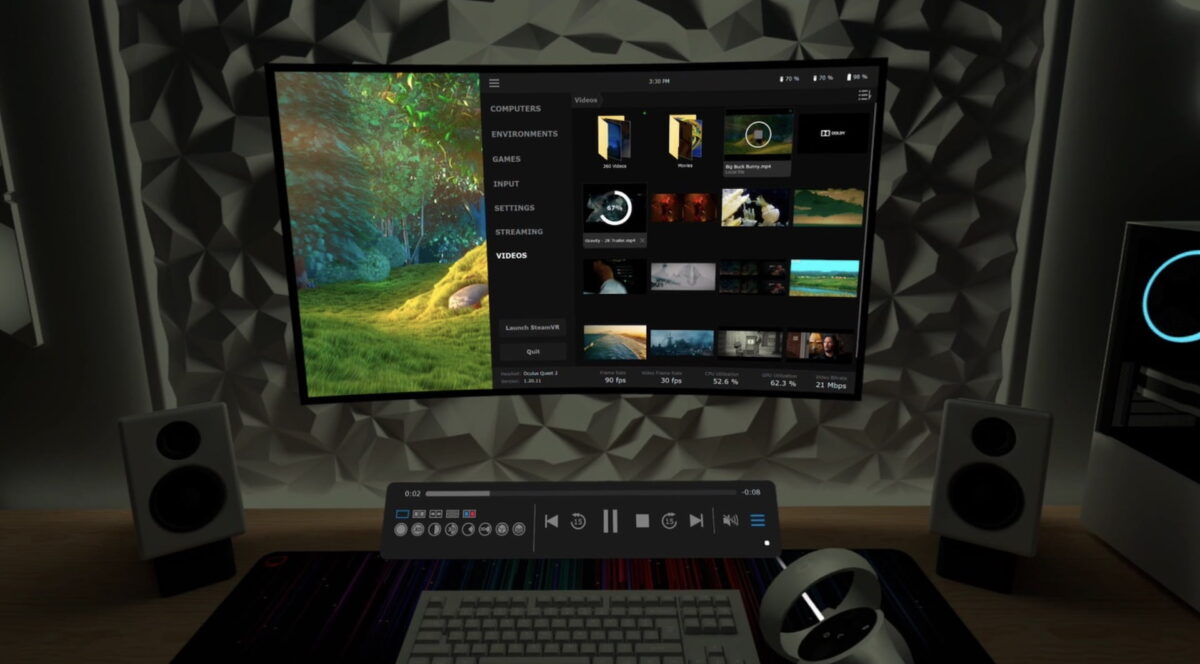Virtual desktop developer reduces online requirements

December 20, 2022:
After a lot of negative feedback, Guy Godin has now rolled out another update for Virtual Desktop that removes the online requirement, at least for the most part (version 1.25.10). An Internet connection is now only necessary when the app is started for the first time or after a software update.
This means that the program can also be used offline, for example on the go with a notebook. Quest users can now install the update on their headsets. The Streamer app on the PC updates automatically after the headset is connected. A corresponding update for Pico devices will follow after Pico's approval.
Original article from December 12:
Virtual Desktop now needs an Internet connection because of piracy
Anyone who uses Virtual Desktop in the future will need an Internet connection. The developer wants to prevent piracy with this.
Virtual Desktop is one of the most popular VR apps. It lets you use your Windows computer in virtual reality, enjoy movies and 2D games in your virtual home theater, and stream PC VR games to your VR headset. In the Quest Store, Virtual Desktop is among the top 20 most successful premium apps based on the number of reviews.
Last week, a new update was released for Virtual Desktop that brings a PC-side performance boost of up to 20 percent, according to developer Guy Godin.
Another new feature is not mentioned in the release notes of the Quest 2 version: Virtual Desktop now requires an Internet connection. Only on the Discord server of the VR app is this documented.
"This version and future versions going forward require internet connectivity to establish a connection to your computer. All traffic remains local. This is unfortunate but piracy has become a real problem and this is the only way I can keep bringing you free updates for life. Hope you'll understand."
Meta Quest 2: When sideloading is abused
The new security measure caused a stir among users of the VR app. Relevant Reddit forums argue for and against the online constraint, and some users write that they have requested a refund in protest.
Godin's reasoning suggests that piracy has only recently become a bigger problem, at least for Virtual Desktop.
Piracy, however, has been with the Quest platform since its inception. This should come as no surprise: The Quest platform supports sideloading, the installation and use of content outside of the Meta Quest Store, which opens the door to piracy.
VR software is reportedly starting to suffer from a piracy problem
Is this a recent jump due to possible economic conditions, or has it been gradually increasing with the user base?
- Brad Lynch (@SadlyItsBradley) December 10, 2022
The platform also currently has little other protection against piracy. This is a surprising fact considering how small and fragile the VR ecosystem is, and how keen Meta is to ensure that developers can make a living from their VR apps and continue to supply the platform with content.
Meta does little to combat piracy
In its abuse policy, Meta warns against piracy and threatens pirates with account suspensions or charges. So far, however, there are no reports that the company is taking action against abuse.
So far, Meta has taken a soft approach and introduced the App Lab as a way to install largely uncurated content on Meta Quest 2 without sideloading, presumably in the hope that interest in apps from unknown sources will wane. There has also recently been the option to try out some VR games for free.
It would be easy for Meta to act more decisively and regulate sideloading more strictly or prevent it altogether. However, this would probably earn Meta the accusation of closing off the ecosystem even more to the outside world.
A step that would contradict Mark Zuckerberg's statement that he wants to build an XR platform that would be like an Android of the XR era, in contrast to Apple's ecosystem approach.
Note: Links to online stores in articles can be so-called affiliate links. If you buy through this link, MIXED receives a commission from the provider. For you the price does not change.